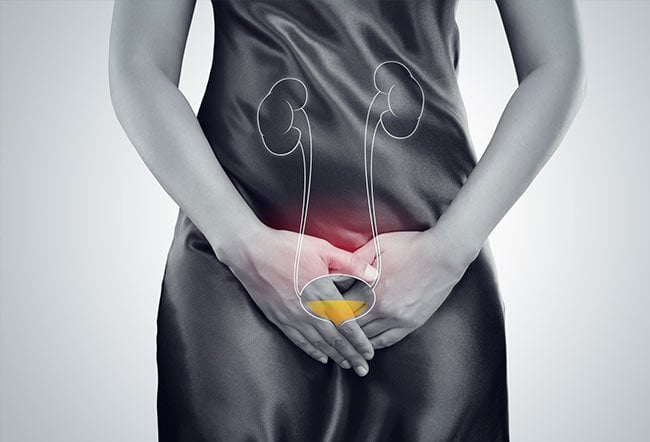You may have experienced signs of urinary tract infection for a long time, like do you often go to the toilet to pee? That sign could be a symptom of a urinary tract infection.

Urinary tract infections can occur throughout the urinary tract system, connecting the kidneys and bladder (ureters) or the bladder to the urinary tract that excretes urine out of the body (urethra).
You can experience several signs if your body has a urinary tract infection. What are the symptoms?
Signs you have a urinary tract infection
Although sometimes it doesn’t cause symptoms, there are some characteristics of a urinary tract infection that you might experience, such as:
- A burning or burning sensation when urinating.
- Frequent pee with little urine.
- There is a constant urge to urinate.
- Urine that smells sharp.
- Urine like coca-cola, red, or pink.
- The urine is cloudy.
- Pain in the pelvis, especially in the middle of the pelvis and around the pelvic bones (in women)
- Pain in the back or lower abdomen.
- Fever or chills (usually indicates that the infection has reached the kidneys).
- Feel tired.
Each area of the urinary system that is infected shows different symptoms.
If the infected area is the bladder, the patient may experience pelvic pressure, lower abdominal discomfort, blood in the urine, and frequent and painful urination.
If the infection is in the urethra, the patient can feel symptoms like a burning sensation when urinating. In addition, sufferers will experience discharge from the genitals, such as vaginal discharge.
If the infected area is the kidney, the sufferer will usually experience a high fever, chills, nausea, vomiting, and pain in the upper back and sides of the body.
Causes of urinary tract infections in women and men

The most common cause of urinary tract infections is E. Coli bacteria. These bacteria can move from the anus to the urethra.
Generally, urinary tract infections occur in the bladder or urethra.
Women tend to have more frequent urinary tract infections because their urethra is shorter, which makes it easier for bacteria to enter the bladder.
In addition, the female urethra has a position close to the anus, making it easier for E.Coli bacteria to infect the female urethra.
However, this bacterial infection of the urinary tract can be triggered by several factors. The following are risk factors that cause a person to get a urinary tract infection (UTI):
1. Wrong treatment of genitals
One of the factors that increase the risk of causing urinary tract infections is the bad habit of not cleaning the genitals properly.
Bacteria can enter the urethra and cause infection due to improper cleaning of the genitals, especially in women after defecating. E.Coli bacteria from the anus generally cause disease of the bladder.
Avoid cleaning the genitals by wiping your hands from the anus to the front. So that you don’t experience signs of a urinary tract infection, start washing your vagina from front to back, that is, from the vagina to the anus.
2. Holding pee after sex
Having sex can be one of the causes of urinary tract infections. Generally, this bacterium will spread through sexual activity between men and women.
The moment of penetration, when the penis or finger enters the vagina, can also cause bacteria to enter the woman’s bladder and urethra.
If you hold pee after sex, bacteria will likely multiply and cause an infection, increasing your risk of experiencing signs of a urinary tract infection.
Urinary tract infections in the urethra can also be caused by bacteria from the anus or contracted from sexual intercourse. Some sexually transmitted diseases that can infect the urethra are herpes, gonorrhea, chlamydia, and so on.
Peeing after sex can help encourage E.coli bacteria in the urethra to come out.
3. Drink less
When the body lacks water or is dehydrated, the kidneys lose fluids. The kidneys need enough fluids to function correctly.
Lack of fluids, especially water, can interfere with your pee quantity and cause the color and smell of your urine to become more concentrated.
Lack of fluid in the kidneys can also provoke bacteria to attack and increase risk factors for signs of urinary tract infection.
Drink more water or meet the recommended daily fluid needs to prevent infection in other body organs.
4. Low immune system
A weak immune system can also be a risk factor for urinary tract infections. The body has its mechanism to fight disease. The immune system works to fight bacteria and viruses while preventing you from health problems.
When the immune system is disturbed, that will also reduce its work function in fighting disease-causing pathogens. As a result, you will be more susceptible to severe illnesses, such as urinary tract infections.
5. Urinary-blocking disease
Several diseases related to the urinary system can also cause urinary tract infections. Generally, the condition appears as a complication of diseases that block urine flow, such as kidney stones and an enlarged prostate.
An enlarged prostate can make the urethra (the channel where urine leaves the body) narrow. As a result, you are unable to empty your bladder.
Do not leave this condition too long. Urine that lives in it can be an ideal growth medium for bacteria. This condition is similar to holding urine for a long time.
6. Use of contraceptives
Women who use contraceptives as a diaphragm also have a higher risk of getting a urinary tract infection than those who use other contraceptives.
In addition, using spermicidal agents in contraceptives can also trigger urinary tract infections.
7. Catheter installation
Those who usually cannot pee on their own after surgery generally need a tube called a catheter to help drain urine out of the body.
Unfortunately, the installation of this catheter can also cause urinary tract infections, so it needs to be cared for properly to keep it hygienic.
How to treat urinary tract infection (UTI)
If you have signs of a UTI, as mentioned, there are several home treatment steps you can take to relieve your symptoms, such as:
- Take paracetamol to reduce pain and overcome fever that may appear
- Rest enough
- Drink lots of water
If symptoms persist, consult a doctor immediately. Furthermore, the doctor will diagnose whether the symptoms you are experiencing are a urinary tract infection.
If you have a UTI, your doctor may prescribe antibiotics as an initial treatment step. Some UTI medications that it may prescribe include:
- Trimethoprim and sulfamethoxazole (Bactrim, Bactrim DS)
- Fosfomycin (Monurol)
- Nitrofurantoin (Macrodantin, Macrobid, Furadantin)
- Cephalexin
- Ceftriaxone
Suppose the UTI returns after treatment, or you have had 2 UTIs in 6 months. In that case, your doctor may prescribe a low-dose antibiotic drug again and a vaginal cream that contains estrogen for you who are postmenopausal.
Long-term UTIs are linked to an increased risk of bladder cancer in people aged 60 and over. So, you need to consult further with a specialist.




